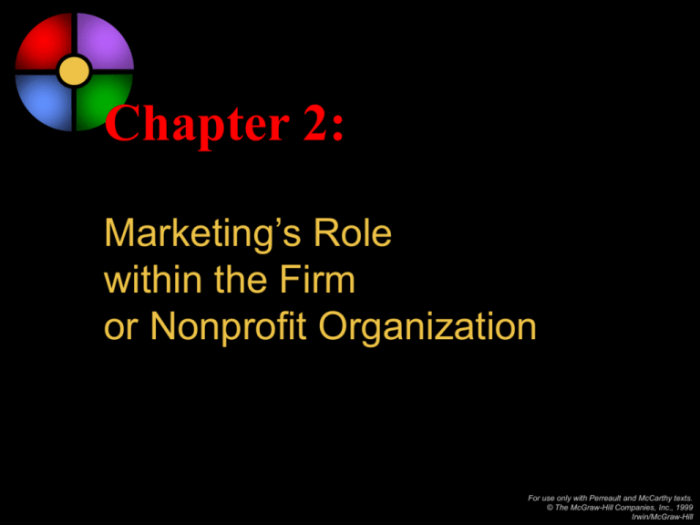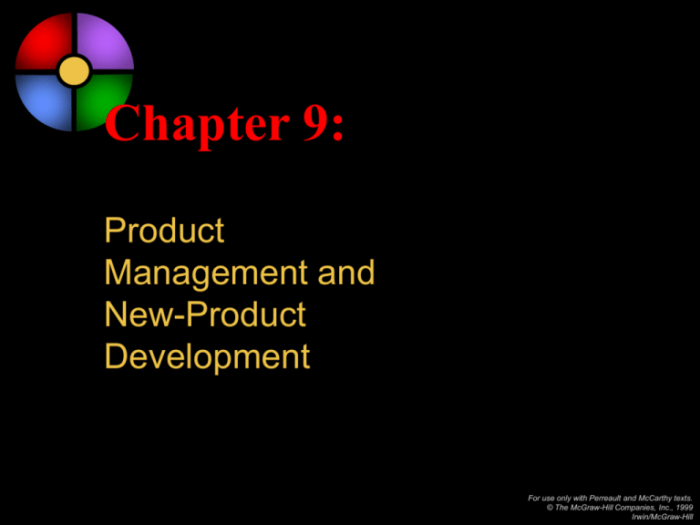Essentials of marketing 18th edition – The 18th edition of Essentials of Marketing takes a deep dive into the multifaceted realm of marketing, providing an up-to-date and comprehensive exploration of the core principles, strategies, and applications that shape this dynamic field.
With a focus on real-world examples and case studies, this revised edition offers a practical and engaging approach to understanding the ever-evolving landscape of marketing, empowering readers to navigate the complexities of today’s business environment.
Marketing Fundamentals
Marketing is the process of creating, communicating, delivering, and exchanging offerings that have value for customers, clients, partners, and society at large.
The core principles of marketing include:
- Target audience:Identifying the specific group of people who are most likely to be interested in your product or service.
- Market segmentation:Dividing the target audience into smaller, more manageable groups based on shared characteristics.
- Value proposition:The unique benefit or value that your product or service offers to the target audience.
Successful marketing campaigns that demonstrate these principles include:
- Nike’s “Just Do It” campaign:This campaign targeted active individuals who were looking for a brand that could inspire and motivate them. The campaign’s message of empowerment and self-belief resonated with the target audience and helped Nike become one of the most successful sportswear brands in the world.
- Apple’s “Think Different” campaign:This campaign targeted creative and innovative individuals who were looking for a brand that could help them express their individuality. The campaign’s message of non-conformity and creativity resonated with the target audience and helped Apple become one of the most successful technology brands in the world.
- Coca-Cola’s “Share a Coke” campaign:This campaign targeted consumers who were looking for a way to connect with friends and family. The campaign’s message of sharing and happiness resonated with the target audience and helped Coca-Cola become one of the most successful beverage brands in the world.
Marketing Research and Analysis

Market research is a crucial aspect of marketing, providing valuable insights into target markets, customer needs, and industry trends. It enables businesses to make informed decisions, develop effective marketing strategies, and gain a competitive advantage.
There are various types of market research methods, each with its applications and benefits. These include:
Quantitative Research
- Surveys: Gathering data from a large sample size through questionnaires or interviews.
- Experiments: Testing different marketing variables to measure their impact on consumer behavior.
- Observational Research: Observing and recording customer behavior in real-world settings.
Qualitative Research
- Focus Groups: Conducting in-depth discussions with small groups of customers to gather their insights and opinions.
- Ethnographic Research: Observing and interacting with customers in their natural environment to understand their cultural and social influences.
- Case Studies: Analyzing specific examples of successful marketing campaigns or customer experiences.
Market research data analysis involves identifying trends, patterns, and insights. This can be done using statistical techniques, such as regression analysis, or qualitative analysis, such as content analysis.
By analyzing market data, businesses can:
- Understand customer needs and preferences.
- Identify market opportunities and threats.
- Evaluate the effectiveness of marketing campaigns.
- Make informed decisions about product development, pricing, and distribution.
Marketing Mix (4Ps)

The marketing mix, also known as the 4Ps of marketing, is a fundamental concept in marketing strategy. It consists of four key elements: product, price, place, and promotion. By understanding and effectively managing these elements, businesses can optimize their marketing efforts and achieve their desired marketing objectives.
Product
The product refers to the tangible or intangible offering that a business provides to its customers. It encompasses the product’s features, benefits, design, branding, and packaging. Developing a successful product involves understanding customer needs and preferences, conducting market research, and creating a product that meets those needs.
Price
Price is the monetary value assigned to a product or service. It plays a crucial role in determining the product’s perceived value, profitability, and market demand. Setting the right price requires considering factors such as production costs, competitor pricing, and customer willingness to pay.
Place
Place refers to the channels through which a product or service is distributed to customers. It involves decisions about distribution channels, logistics, and inventory management. Effective place strategies ensure that products are available to customers when and where they want them.
Promotion, Essentials of marketing 18th edition
Promotion encompasses the various communication activities used to inform, persuade, and remind customers about a product or service. It includes advertising, public relations, sales promotion, direct marketing, and social media marketing. Effective promotion strategies help businesses build brand awareness, generate leads, and drive sales.
Digital Marketing: Essentials Of Marketing 18th Edition

Digital marketing has become an essential component of modern business strategies, enabling companies to connect with customers and promote their products or services through digital channels.
Key digital marketing channels include:
- Search engine optimization ()
- Social media marketing
- Email marketing
- Content marketing
- Affiliate marketing
Each channel offers unique advantages, such as:
- : Improves website visibility in search engine results pages (SERPs), driving organic traffic.
- Social media marketing: Allows businesses to engage with customers, build brand awareness, and drive sales.
- Email marketing: Provides a direct line of communication with potential and existing customers.
- Content marketing: Creates valuable content that attracts and educates customers, establishing thought leadership.
- Affiliate marketing: Leverages partnerships with other businesses to promote products or services and earn commissions.
Effective digital marketing campaigns require a strategic approach, including:
- Defining clear goals and objectives
- Selecting the appropriate channels
- Creating high-quality content
- Tracking and measuring results
- Continuously optimizing and improving campaigns
Social Media Marketing
Social media marketing has become an essential aspect of marketing strategies for businesses of all sizes. It provides a unique opportunity to connect with target audiences, build relationships, and drive brand awareness and sales.
Major Social Media Platforms
- Facebook:The largest social media platform with over 2.9 billion monthly active users. Ideal for reaching a broad audience and building brand awareness.
- Instagram:A visual-based platform with over 1 billion monthly active users. Suitable for businesses focusing on visual content and influencer marketing.
- Twitter:A microblogging platform with over 436 million monthly active users. Effective for real-time updates, news, and customer engagement.
- LinkedIn:A professional networking platform with over 936 million monthly active users. Ideal for B2B marketing, job recruitment, and industry thought leadership.
- TikTok:A short-form video platform with over 1 billion monthly active users. Popular among younger audiences and businesses seeking to engage with them.
Tips for Effective Social Media Marketing
- Define Target Audience:Identify the specific demographics, interests, and behaviors of your target audience to tailor your content and messaging.
- Create Engaging Content:Develop high-quality, relevant, and visually appealing content that resonates with your audience and aligns with your brand identity.
- Use Social Media Advertising:Leverage paid advertising options to reach a wider audience and target specific demographics or interests.
- Track and Analyze Results:Monitor key metrics such as engagement, reach, and conversions to measure the effectiveness of your social media campaigns and make adjustments as needed.
- Engage with Followers:Respond to comments, questions, and messages promptly to build relationships and foster a sense of community.
Content Marketing
Content marketing is a strategic marketing approach that involves creating and distributing valuable, relevant, and consistent content to attract and retain a clearly defined audience and drive profitable customer action.
Content marketing offers numerous benefits for businesses, including:
- Increased brand awareness and visibility
- Improved search engine rankings and organic traffic
- Lead generation and customer acquisition
- Enhanced customer engagement and loyalty
- Increased sales and revenue
Types of Content Marketing
There are various types of content marketing, each with its unique applications:
- Blog posts:Provide valuable information, insights, and thought leadership on relevant topics.
- Articles:Offer in-depth analysis, research, and expert perspectives on specific topics.
- Infographics:Visualize complex information in an engaging and accessible manner.
- Videos:Engage audiences through compelling storytelling, product demonstrations, and tutorials.
- E-books:Provide comprehensive information on specific topics, often gated to generate leads.
- White papers:Offer detailed research and analysis on industry trends and challenges.
- Case studies:Showcase successful customer experiences and demonstrate the value of products or services.
Guidelines for Creating and Distributing High-Quality Content
Creating and distributing high-quality content is crucial for effective content marketing:
- Define your target audience:Understand their interests, pain points, and content preferences.
- Establish a clear content strategy:Artikel your content goals, target s, and distribution channels.
- Create valuable and engaging content:Provide useful information, solve problems, and inspire your audience.
- Optimize for search engines:Use relevant s and optimize content for search visibility.
- Promote your content:Utilize social media, email marketing, and other channels to reach your target audience.
- Track and measure results:Monitor key metrics such as website traffic, engagement, and lead generation to evaluate the effectiveness of your content marketing efforts.
Marketing Measurement and Analytics
Marketing measurement and analytics are crucial for evaluating the effectiveness of marketing campaigns and making data-driven decisions. They provide insights into customer behavior, campaign performance, and return on investment (ROI).
Key metrics used to measure marketing performance include website traffic, leads generated, conversion rates, customer lifetime value, and brand awareness.
Tools and Techniques
Various tools and techniques can be used to analyze marketing data and optimize campaigns. These include:
- Web analytics tools (e.g., Google Analytics) provide data on website traffic, user behavior, and conversion rates.
- Customer relationship management (CRM) systems track customer interactions and provide insights into customer behavior and preferences.
- Social media analytics tools (e.g., Hootsuite) monitor social media performance and provide insights into audience engagement.
- Marketing automation platforms automate marketing tasks and provide data on campaign performance and lead generation.
- Data visualization tools (e.g., Tableau) help visualize marketing data and identify trends and patterns.
Ethical and Sustainable Marketing
Ethical and sustainable marketing practices have become increasingly important in today’s business landscape. Consumers are becoming more aware of the environmental and social impact of their purchases, and they are increasingly demanding that businesses operate in a responsible and ethical manner.
There are a number of ethical considerations that businesses must take into account when marketing their products and services. These include:
- Truthfulness and accuracy:Businesses must ensure that their marketing claims are truthful and accurate. They should not make false or misleading statements about their products or services.
- Fairness and competition:Businesses must compete fairly and ethically. They should not engage in deceptive or predatory practices that harm competitors or consumers.
- Respect for privacy:Businesses must respect the privacy of their customers. They should not collect or use personal information without their consent.
- Social responsibility:Businesses have a responsibility to operate in a way that benefits society as a whole. They should consider the environmental and social impact of their products and services, and they should take steps to minimize any negative impacts.
In addition to being ethical, it is also important for businesses to be sustainable. Sustainability means meeting the needs of the present without compromising the ability of future generations to meet their own needs. Businesses can achieve sustainability by reducing their environmental impact, using renewable resources, and supporting social and economic development.
There are a number of benefits to implementing ethical and sustainable marketing practices. These benefits include:
- Increased sales and profits:Consumers are more likely to buy products and services from businesses that they perceive as being ethical and sustainable.
- Improved brand reputation:Businesses that are ethical and sustainable have a better reputation than those that are not. This can lead to increased sales and profits.
- Reduced risk:Businesses that are ethical and sustainable are less likely to face legal or regulatory challenges. This can save them money and protect their reputation.
- Increased employee morale:Employees are more likely to be proud to work for businesses that are ethical and sustainable. This can lead to increased productivity and innovation.
There are a number of examples of companies that have successfully implemented ethical and sustainable marketing initiatives. These companies include:
- Patagonia:Patagonia is a clothing company that is known for its commitment to sustainability. The company uses recycled materials in its products, and it supports environmental causes.
- Ben & Jerry’s:Ben & Jerry’s is an ice cream company that is known for its social activism. The company supports a number of social and environmental causes, and it uses its products to promote social change.
- TOMS Shoes:TOMS Shoes is a shoe company that is known for its “One for One” program. For every pair of shoes that TOMS sells, the company gives a pair of shoes to a child in need.
These are just a few examples of companies that are leading the way in ethical and sustainable marketing. As consumers become more aware of the environmental and social impact of their purchases, it is likely that more and more businesses will adopt ethical and sustainable practices.
Answers to Common Questions
What are the key updates in the 18th edition of Essentials of Marketing?
The 18th edition incorporates the latest trends and developments in the field of marketing, including the growing significance of digital marketing, social media, and content marketing. It also addresses contemporary issues such as ethical marketing and sustainability.
How does Essentials of Marketing differ from other marketing textbooks?
Essentials of Marketing stands out with its clear and concise writing style, making complex concepts accessible to readers. Its focus on real-world examples and case studies provides a practical perspective on the application of marketing principles.
Is Essentials of Marketing suitable for both undergraduate and graduate students?
Yes, Essentials of Marketing is designed to cater to the needs of both undergraduate and graduate students. Its comprehensive coverage and accessible writing style make it an ideal resource for students at different levels of study.